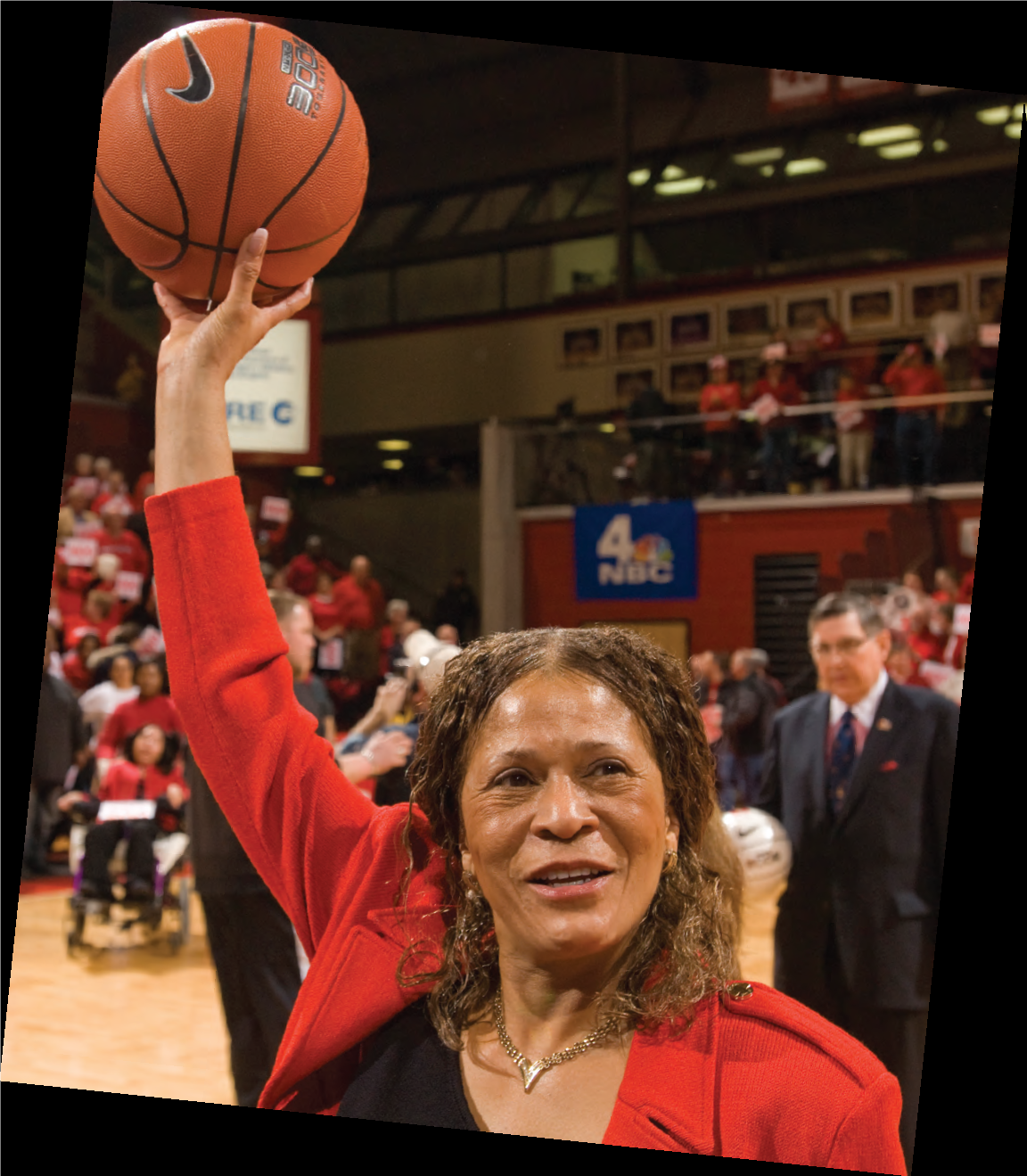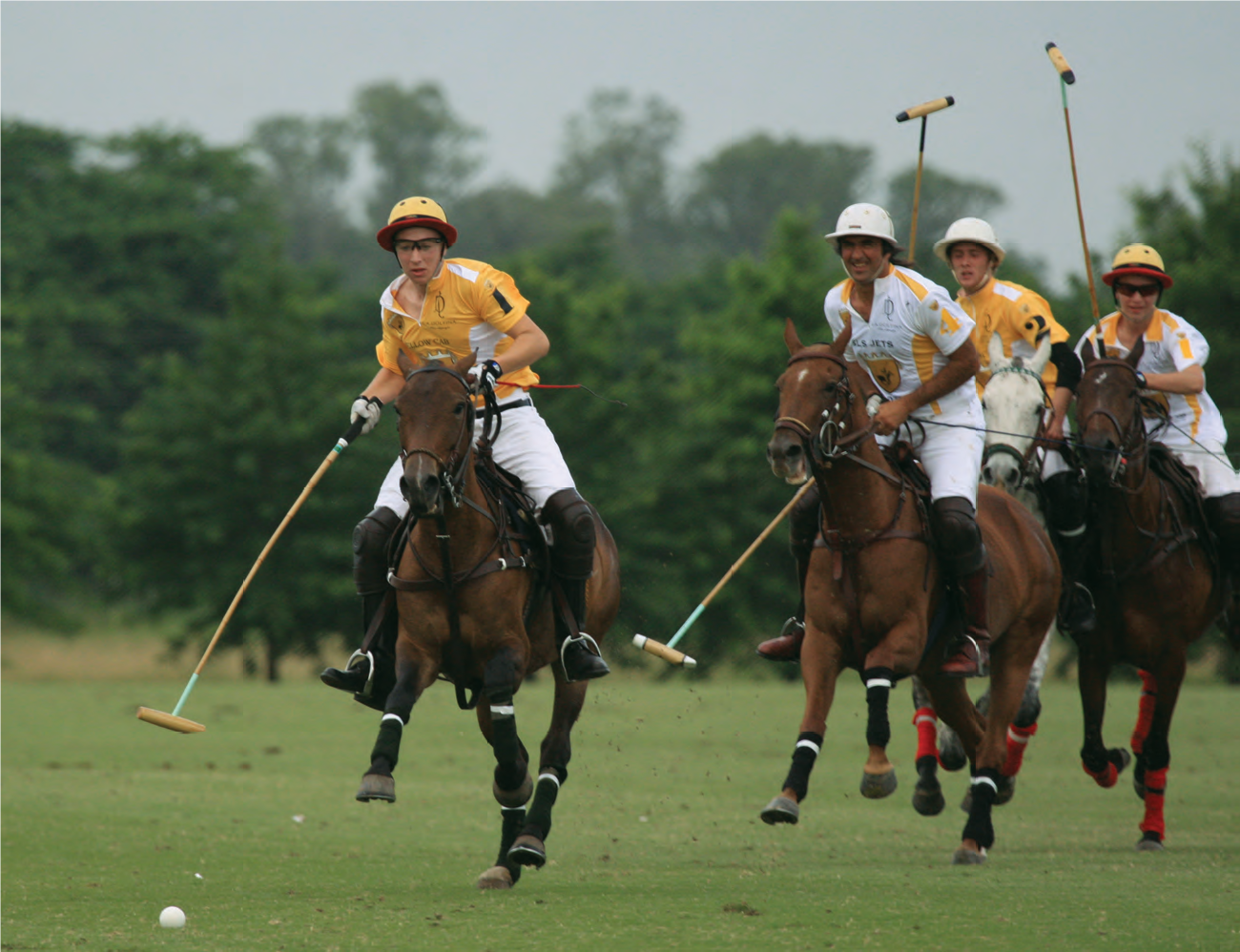- 393 Route 18 South East Brunswick NJ 08816
- 732-254-5115
- visit website
- 3555 Route 22 East Whitehouse NJ 08876
- 908-534-2534
- visit website
- 201 Shunpike Rd. Springfield NJ 07081
- (800)PGA-GOLF (800-742-4653)
- visit website
- 2980 Rt. 10 West Morris Plains NJ 07950
- 973-267-0964
- visit website
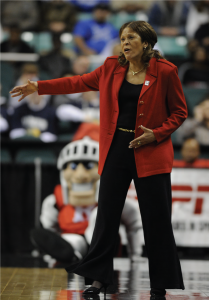
Grant Halverson/Rutgers University
If you had to win one game and could take any coach in the state, Vivian Stringer would unquestionably be among your top candidates. If you could select a coach to guide your daughter through the most important four years of her life, the Rutgers basketball legend would be a no-brainer. Coach Stringer has graced the Garden State with her presence since 1995, and during that time she has elevated the state of the game, both on and off the court. A three time Coach of the Year, she is one of only three people in women’s hoops history to win 800 games.
As it happens, EDGE Assignments Editor ZACK BURGESS has some history with his interview subject—they first crossed paths 10 years ago when he covered her Rutgers team for The New York Times. He knows as well as anyone that her triumphs have not come without their share of tragedy. She has persevered through the deaths of her father and husband, a daughter devastated by meningitis, and a son who nearly lost his life in a car crash. Some people define “grace” as the bestowing of God’s blessing. Zack pulled Vivian Stringer off the court to talk about this idea, as well as the dual challenges of being a coach and mother. And yes, he managed to sneak in an Imus question!
EDGE: Given the dramatic ups and downs and challenges in your life and career, do you feel blessed?
VS: Yes, I do. I wake up every day and witness other people’s plights, and just shake my head and wonder, ‘How do you handle it all?’ You just have to understand that when there is life, there is hope. Blessed? Yes.
EDGE: What does it mean to you to go into the Basketball Hall of Fame with Michael Jordan this year?
VS: I really haven’t allowed myself to think about it. I probably would be paralyzed if I thought about it too much. To go in with arguably the greatest class the Hall of Fame has ever seen is an honor. I have to prepare myself for the greatest day in my life, besides the birth of my children. It’s overwhelming. When I started at Cheyney State (in Philadelphia), I never believed that I would find myself receiving such a huge honor.
EDGE: How soon after you got the coaching job at Cheyney State did you know this was your calling?
VS: Are you kidding me? The minute I got there! I was just grateful they gave me a chance to coach the team. It was magical. I was 22 years old and loving every minute of it. It’s what I was meant to do.
EDGE: How do feel you did raising a family and being a college basketball coach?
VS: I did a masterful job as a parent of keeping basketball and my family separate. But now I wish I wouldn’t have kept things so separate. Those trips through the Midwest were tough. We were going from Iowa to Wisconsin. Instead of being on the team bus, I wish I had ridden right behind the bus for those six or seven hours, giving my kids more mommy time. Listening to them say mommy this, and mommy that. I was fortunate enough to have the best husband in the world.
EDGE: Where did being a coach and being a mom intersect?
VS: My son David played Division-I football. So not only do I know what it’s like to go into a home and recruit, I know what it’s like to be on the other end of the recruiting process as a parent. I know during his recruitment process I often looked for who was going to care about my son—who was going to push him to be the best that he can be, who was going to understand how special he is as a person. Ultimately, that’s what every parent wants. They want to know that their child is going to be safe and understood. I try to be the coach I would want for someone to be to my child. I want parents to understand that I am a parent, too. Parents have a right to see their child walk through your program okay, and emerge a better person at the end.
EDGE: Yet you have a reputation for being tough on your players. Is that fair?
VS: They say that I don’t get players sometime because I am known for being hard. What makes what I do any different from anyone else? Players who go to the University of Tennessee know they are going to a place where they just flat-out had better get it done. What I am trying to teach my players is to be good women. I want them to understand that when they come to Rutgers, they are not only here to play basketball, but to become young women who know how to empower themselves as well.
EDGE: Someone once told me talent and hard work always wins out. Do you believe that?
VS: I think perseverance, talent and hard work is what we should say. Thirty-eight years of doing this. I would like to think when my story is told that it’s one of perseverance, because you can have all the talent in the world—and you might even have a good work ethic—but without perseverance, none of it matters.
EDGE: What are the qualities you look for when you are recruiting a player?
VS: She has to have the will and the drive to be the best, and the skill to play the game. Someone who is not satisfied unless she is as good as she can possibly be, which means she is probably never satisfied. The more difficult something becomes, the more she sees it as an opportunity versus an obstacle. These qualities will carry her throughout the rest of her life.
EDGE: Have you ever gone against your rule and taken a player who had the skill but maybe not the drive?
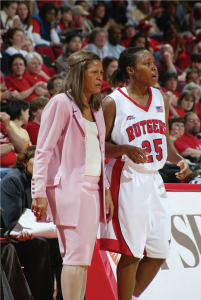
Larry Levanti/Rutgers University
VS: Sure I have. It doesn’t work.
EDGE: Getting back to the idea of grace, I have a final question. Lost in the uproar after Don Imus made those infamous remarks about your players was the fact that you were quite gracious in accepting his apology. Why was that important to you?
VS: I think we found ourselves in a situation where we needed to forgive. My faith wouldn’t have me do it any other way and I knew that. When Imus said what he said, it hit me to the bone. I’ve never been one to be able to smile and say it’s over—I really need to do a much better job—so in order for us to go forward, we just needed to forgive.
EDGE: How many of those girls are still on the team?
VS: We have four kids left from that class who are now going to be seniors.
EDGE: And how are they doing?
VS: One is going to be doctor, one a pharmacist, one wants to be lawyer and another who can do whatever she wants. To see what these young ladies went through and have them come through it with their dignity and honor intact is a wonderful thing. I’m very proud of them.
In the Garden State, Polo Is a ‘Family Thing’
Thousands of families in suburban New Jersey wake up on summer Sundays to a little something I like to call the eternal struggle. The kids want to kick around in cutoffs and flip-flops. Dad is looking to devote the day to the “competitive spirit” (translation: watch sports). Mom? By the time the sun sets, she would like to feel as if she’s moving forward—psychically and socially— not just treading water. Like most, I once assumed the solution to this Sunday dilemma was unattainable. 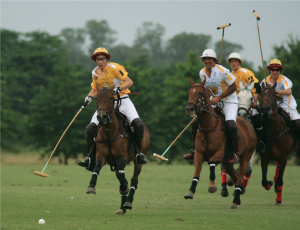 And I’m not one to give up easily. I run a business that presents a new twist or challenge on an hourly basis; if I don’t hear someone screaming a four-letter word, I actually worry that something’s wrong. Perhaps that is why my favorite four-letter word is Polo. Yes, I know. We tend to think of polo as an exclusive pastime for those who enjoy the privileges of wealth and influence. And in some parts of the world this is true. But I have experienced firsthand the inclusive side of polo, too— the side that brings people from all walks of life together in a beautiful setting, transforming that sleepy Sunday into a vibrant sporting and social event. Some come to watch the action. Others come to connect with old friends and meet new ones. Big kids come and so do little ones. And a lot of people may not admit it, but they come for the amazing food. The point is that everyone comes. For those interested in business or social networking opportunities, well, obviously that goes on all the time at a polo match. In fact, much like golf, the two are constantly intertwined. Unlike golf, it doesn’t take a mother or father away from home all day. Indeed, I know of no other leisure activity that promotes the family dynamic the way that polo does. And this applies to virtually any family. Families with young children will find plenty to do at a polo match.
And I’m not one to give up easily. I run a business that presents a new twist or challenge on an hourly basis; if I don’t hear someone screaming a four-letter word, I actually worry that something’s wrong. Perhaps that is why my favorite four-letter word is Polo. Yes, I know. We tend to think of polo as an exclusive pastime for those who enjoy the privileges of wealth and influence. And in some parts of the world this is true. But I have experienced firsthand the inclusive side of polo, too— the side that brings people from all walks of life together in a beautiful setting, transforming that sleepy Sunday into a vibrant sporting and social event. Some come to watch the action. Others come to connect with old friends and meet new ones. Big kids come and so do little ones. And a lot of people may not admit it, but they come for the amazing food. The point is that everyone comes. For those interested in business or social networking opportunities, well, obviously that goes on all the time at a polo match. In fact, much like golf, the two are constantly intertwined. Unlike golf, it doesn’t take a mother or father away from home all day. Indeed, I know of no other leisure activity that promotes the family dynamic the way that polo does. And this applies to virtually any family. Families with young children will find plenty to do at a polo match.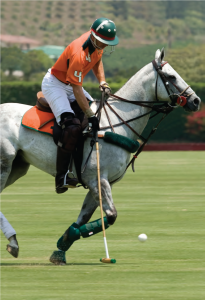 There are the magnificent ponies to admire, the spotless stables to explore, a variety of kid-friendly activities and, naturally, lots of other young boys and girls. Families with teenagers typically park the car, get a feel for the layout and logistics, and then watch with confidence (and relief) as their sons and daughters fan out on their own—leaving mom and dad to enjoy a civilized afternoon and recharge their batteries for the week ahead.
There are the magnificent ponies to admire, the spotless stables to explore, a variety of kid-friendly activities and, naturally, lots of other young boys and girls. Families with teenagers typically park the car, get a feel for the layout and logistics, and then watch with confidence (and relief) as their sons and daughters fan out on their own—leaving mom and dad to enjoy a civilized afternoon and recharge their batteries for the week ahead.
THE CULTURE The people who gather to watch a polo match tend to have a few things in common. They enjoy good food, engaging conversation and, let’s face it, people-watching. Consequently, you won’t see too many folks wandering around in jeans and a t-shirt. You will see some big hats— hats that are unlikely to be worn anywhere but a polo match. As a rule, polo fans dress neatly and nicely. This includes the kids, who seem amazed that they can actually enjoy themselves without looking like their role models on Jersey Shore. Do you have to be wealthy to attend and enjoy a polo match? No. Polo is an expensive sport to play (just ask my accountants) but, in our area, a season’s pass to a polo club can be had for less than the cost of two tickets to a Yankees game. Are there wealthy people at a polo match? Most definitely. But they are not as easy to pick out as you might think; the old expression, “You can’t judge a book by its cover” often applies here. That’s because it’s not all about the money. It’s about the camaraderie, it’s about the aesthetics, it’s about people who—like the elite athletes out there controlling their powerful animals—are interested in elevating their game. Ultimately, I believe this is what makes polo such an inclusive sport. Truth be told, I encountered far less resistance from people in American polo when I first started getting into the sport in the 1990s than I did when I came to America from Europe as a boy in the 1970s. The real tip-off that there are multimillionaires milling around in the crowd is the number of corporate sponsors splashing their names on an event, and also the high-end jewelers and other retailers who like to display their wares to attendees. They know that there are lots of current and future customers at the match, and they also know that many people only watch some of the action—they come to socialize and shop, too. If you’re in the market for a new car, new jewelry, new wardrobe, new stock broker, new caterer or even a new face, there is a lot to catch your eye away from the field.
THE COMPETITION Lest we forget, polo is a serious sport. It is fast. It is exciting. And it has an element of danger. The athletes in the saddle must perform both as individuals and as members of a team, and they need unbelievable hand-eye coordination.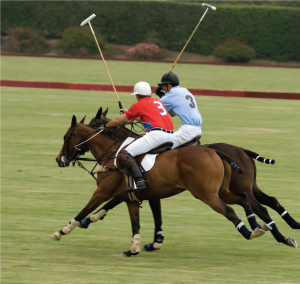 The animal that riders must control is a “pony” in name only—they are full-on horses, four to eight inches taller than the riding ponies at your local stable, and a lot stronger and swifter. They tip the scales at around 1,000 pounds. When they thunder past the spectators, the air crackles with energy. A good polo pony can cost a cool quarter-million dollars or more, and requires up to two years of training before they are ready for competition. They continue to train daily, often twice a day. A polo pony must respond to a rider’s instructions through a variety of one-handed tugs on the reins and subtle weight shifts and leg movements. They are primped and pampered in between matches, but once the action starts they are pushed to their absolute limits. Many first-time polo fans are amazed to see how often a player changes mounts. His string of ponies usually ranges between three and seven. If you’ve ever watched an ice hockey team change lines, then you have some idea of the level of exertion involved. A quality horse can get its rider to the ball. From
The animal that riders must control is a “pony” in name only—they are full-on horses, four to eight inches taller than the riding ponies at your local stable, and a lot stronger and swifter. They tip the scales at around 1,000 pounds. When they thunder past the spectators, the air crackles with energy. A good polo pony can cost a cool quarter-million dollars or more, and requires up to two years of training before they are ready for competition. They continue to train daily, often twice a day. A polo pony must respond to a rider’s instructions through a variety of one-handed tugs on the reins and subtle weight shifts and leg movements. They are primped and pampered in between matches, but once the action starts they are pushed to their absolute limits. Many first-time polo fans are amazed to see how often a player changes mounts. His string of ponies usually ranges between three and seven. If you’ve ever watched an ice hockey team change lines, then you have some idea of the level of exertion involved. A quality horse can get its rider to the ball. From  there, however, it’s up to the player to pass, defend or score. There are four players per side, each with different responsibilities. The point of polo is to work the ball up the field and knock it through a goal that is eight yards wide. The field itself is 300 yards long with tall sideboards to protect the spectators and keep the ball in play. Defense is all about position and timing. A player can thwart an opponent by interfering with his mallet, or by “riding him off” (picture a half-ton bodycheck). For us, polo is a family sport no matter where we are sitting. My great joy is that I now train and compete with my sons, Tyler, Shaun and Jeffrey. I have been working on my polo game for more than a decade and still feel like I’m learning something new every day. Often I am asked about the skill level required to play polo at a world-class level. The truth is that it’s difficult to define. Try hitting a golf ball one-handed on a bicycle at 30 mph without ending up in a heap and you’ll have some idea of the talent and training involved. Better yet, come out to a match this summer. You’ll see…it really is a family thing. EDGE
there, however, it’s up to the player to pass, defend or score. There are four players per side, each with different responsibilities. The point of polo is to work the ball up the field and knock it through a goal that is eight yards wide. The field itself is 300 yards long with tall sideboards to protect the spectators and keep the ball in play. Defense is all about position and timing. A player can thwart an opponent by interfering with his mallet, or by “riding him off” (picture a half-ton bodycheck). For us, polo is a family sport no matter where we are sitting. My great joy is that I now train and compete with my sons, Tyler, Shaun and Jeffrey. I have been working on my polo game for more than a decade and still feel like I’m learning something new every day. Often I am asked about the skill level required to play polo at a world-class level. The truth is that it’s difficult to define. Try hitting a golf ball one-handed on a bicycle at 30 mph without ending up in a heap and you’ll have some idea of the talent and training involved. Better yet, come out to a match this summer. You’ll see…it really is a family thing. EDGE
Editor’s Note: Simon Garber is the owner of the Yellow Cab and SJS Jets polo teams, as well as the Polo Club of Colts Neck. For more information about this summer’s Sunday schedule, log onto poloclubofcoltsneck.com. Special thanks to Dario Garcia and Susan Belfer for their help on this story.


